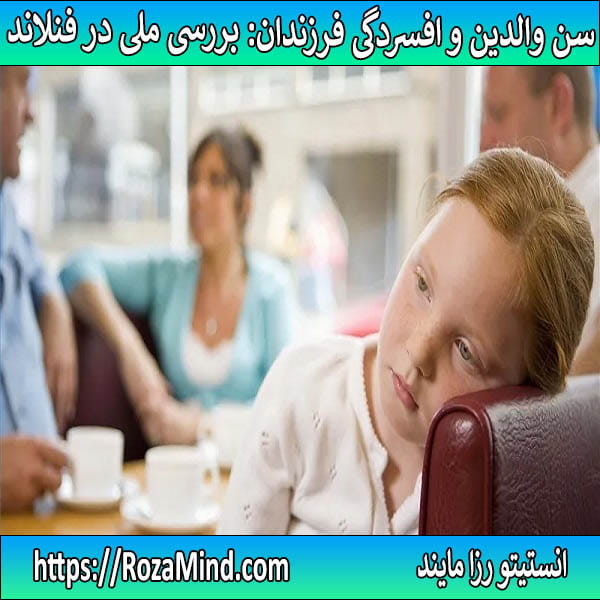پژوهشگران دانشگاه تورکو فنلاند در یک پژوهش ملی به بررسی رابطه به عوامل دموگرافیک بویژه سن والدین و افسردگی فرزندان آنها در جمعیت این کشور پرداختند.
روش پژوهش:
در این پژوهش تحلیل ثانوی داده های حاصل از 1 میلیون و 240 هزار تولد در بازه زمانی بین 1 ژانویه 1987 تا 31 دسامبر 2007 در کشور فنلاند مورد بررسی قرار گرفتند.
افسردگی کودکی بر اساس معیارهای ICD-9 و ICD-10 تعیین شدند. تعداد 37682 نفر که در بازه زمانی بین 1995 و 2007 به دنیا آمده بودند و تا 31 دسامبر 2012 تشخیص MDD گرفتند، شناسایی شدند.
موارد مورد بررسی شامل سن والدین، سوابق روانپزشکی والدین، سوابق افسردگی والدین، وضعیت اجتماعی-اقتصادی والدین حین تولد، محل سکونت والدین حین تولد، وضعیت تاهل والدین حین تولد، مصرف دخانیات والدین حین تولد، تعداد زایمان ها قبل تولد، وزن فرد حین تولد، و سال تولد بودند.
یافته ها:
- رابطه بین افسردگی بالینی فرزندان و سن والدین به شکل U است. سن پایین و یا بالای والدین حین تولد رابطه مستقیم با افسردگی فرزندانشان دارد.
- بیشترین میزان افسردگی بالینی در کودکان با پدران بالای 50 سال سن و یا مادران زیر 20 سال سن جین تولد فرزند، مشاهده شده است.
- کمترین میزان افسردگی بالینی در کودکانی است که والدین آنها حین تولدشان سنین بین 25 تا 29 سال را دارند.
راهبردهای کارکردی:
- یکی از عوامل مهم در بروز افسردگی کودکان و نوجوانان سن والدین آنها حین تولدشان است. والدین با سنین بالای 50 و زیر 20 سالگی در معرض بیشترین خطر برای ابتلای فرزندشان به افسردگی هستند.
- سنین بین 25 تا 29 سالگی امن ترین سنین برای فرزندآوری از لحاظ کاهش ریسک اختلالات خلقی (افسردگی) هستند.
- هزینه های ناشی از افسردگی برای خانواده و نظام درمان و نیز هزینه های از کارافتادگی جمعیت جوان برای جوامع بسیار فراتر از حد تصور بوده و برای دولتها خسارتهای جبران ناپذیری به همراه دارد.
- افزایش سطح اختلالات خلقی (افسردگی) منجر به افزایش خطر خودکشی در بین جمعیت جوان جامعه می شود.
- آموزش مهارت های مدیریت هیجانی و مهارت های فرزند پروری عامل مهمی در کاهش افسردگی بالینی و خودکشی فرزندان در خانواده ها است.
Parental age and risk of depression: A nationwide, population-based case-control study
Abstract
Background
The global prevalence of depression has increased in recent decades and so has the average age of parenthood.
Younger and older parental age have been associated with several mental disorders in their offspring, but the associations for depression have been inconsistent.
Methods
This study comprised 37,682 singleton births in Finland from 1987- 2007. The subjects were living in Finland at the end of 2012 and had a depressive disorder recorded in the Care Register for Health Care.
We also randomly identified 148,795 controls from the Population Register. When missing observations excluded the sample was Ncases=18,708 and Ncontrols=77,243.
The results were adjusted for the parents’ psychiatric history, depression history, marital status and place of birth. the mothers’ maternal socioeconomic status, smoking during pregnancy and previous births and the children’s birth weight.
Results
We found a U-shaped association between offspring depression and the age of both parents. The highest odds of depression occurred when the fathers were aged 50 plus years (adjusted Odds Ratio (ORa). 1.51, 95% CI 1.23-1.86) and the mothers were under 20 (ORa 1.44, 95% CI 1.29-1.60) compared to the reference category of parents aged 25–29 years.
Limitations
The study was limited to depression diagnosed by specialised health care services and had a relatively short follow-up period. Some data were missing and that could lead to risk estimation biases.
Conclusion
Diagnosed depression was higher among the offspring of younger and older parents. The results suggest that the age of the parent is etiologically associated with offspring depression.
Keywords
Offspring depression, Parental age, Paternal age, Maternal age.

The global prevalence of depression has increased in recent decades and so has the average age of parenthood. Younger and older parental age have been associated with several mental disorders in their offspring...



